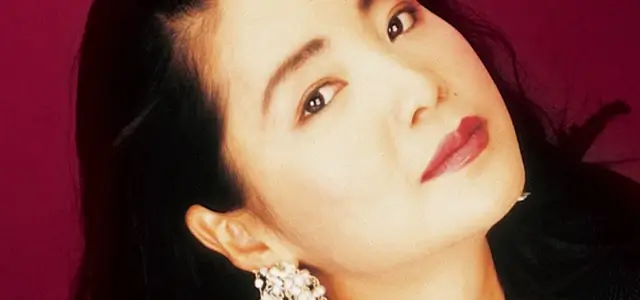啊
何日君再来
好花不常开
好景不常在
愁堆解笑眉
泪洒相思带今宵离别后
何日君再来
喝完了这杯
请进点小菜
人生能得几回醉
不欢更何待来,来,来,
喝完这杯再说吧!
今宵离别后
何日君再来停唱阳关叠
重擎白玉杯
殷勤频致语
牢牢抚君怀今宵离别后
何日君再来
喝完了这杯
请进点小菜
人生能得几回醉
不欢更何待唉!
再喝一杯,干了吧!
今宵离别后
何日君再来
When Willst Thou Come Back Again
Flowers don’t always blossom
Sceneries don’t always exist
Accumulated sorrow tightens my smiling eyebrows
As my tears soak the nostagic sashAfter the farewell tonight
When willst thou come back again?
After thou hast finished this cup
Please have some appetizers
Few times in life can we get drunk
Shouldn’t we have fun now?Come on, come on, come on
Just have this drink before thou sayest something
After the farewell tonight
When willst thou come back again?Sing the farewell song no more
Hold the white jade calix anew
I’m solicitous about thee whenever thou art sad
Just in order to grasp thy heart tightAfter the farewell tonight
When willst thou come back again?
After thou hast finished this cup
Please have some appetizers
Few times in life can we get drunk
Shouldn’t we have fun now?Well,
Have another drink and cheers!
After the farewell tonight
When willst thou come back again?
By Isaiah Siegfried Chen
When will you visit again
Pretty flowers infrequently bloom
Good times hardly last
Frown of sorrows erases [usual] cheerfulness [on my] brows
Ribbon of yearning splattered with tearsOnce [you have] departed tonight
When will you visit again
Once this cup is drunk
Please do taste [these] dishes [made for you]
How few are occasions for [celebratory] tipsiness in a lifetime
Why wait any longer to be merryCome, come, come
Empty this cup then [we] talk [some more]
Once [you have] departed tonight
When will you visit againPause the repeating [verses of] farewell song
[Let’s] raise the nephrite cups again
Dutifully [I am] plying words [of compliments]
[To] vigorously stir your heart[‘s affection]Once [you have] departed tonight
When will you visit again
Once this cup is drunk
Please do taste [these] dishes [made for you]
How few are occasions for [celebratory] tipsiness in a lifetime
Why wait any longer to be merryPity!
Drink another cup, bottoms up
Once [you have] departed tonight
When will you visit again
啊
Comments
Line 4 淚灑相思帶 Throughout the history of Chinese writings, there have been so many examples of this device of deliberately conflating 思 (thoughts) with 絲 (silk or threads). Here it is deliberately mixing up 思帶 to mean 絲帶 (a ribbon).
While refreshingly different to work this the opposite way, it does come across looking particularly clumsy as 相思帶 has no easy meaning, at least none without forcing it to mean something like a ribbon of mutual yearning. Indeed, 相絲帶 is equally clunky. The line is supposed to imply yearning and an idea that two people while no longer together are still tethered in thoughts. For this technique/device to work, everything needs to have double meanings; this is missing here.
I felt that it should have been 淚灑香絲帶 (a scented ribbon) or 淚灑向絲帶 (towards a ribbon) or 淚灑湘絲帶 (wet a ribbon). They all pronounce the same. My preference is the last which means literally character by character 淚 (tears) 灑 (sprinkle) 湘 (to flow or to wet) 絲帶 (ribbon).
Author’s comments:
This text is quite sophisticated even at first glance. It is written in the first person, thus 君 here is a slightly formal second person “you” instead of a noble man.
不常 can have several meanings. Literally: not often/frequent or not constantly or not perpetually or not lasting or even not normally. In the context of the song, all are equally applicable. There is perhaps a slight leaning towards “not often” suggesting far fewer good moments than miserable ones.
好景 This also has at least two meanings. Character by character, “good” “view”, but as a word constructed from the two characters, it means “good times” or “prosperity”. The four character word 好景不常 is very commonly spoken for “prosperity is rare” or “prosperity doesn’t last”. This is the only applicable meaning in the song. the song is using the idiom 好花不常開 好景不常在 verbatim.
愁堆 is not a “heap/pile of sorrows” which invariably is how this term is translated character by character online. 堆 is more about “bunching up” or “pushed together”. In the context of this line specifically where there is a mention of brows, there can be only one meaning: “frowning”.
相思帶 This is yet another example of deliberately conflating the character 思 with 絲. Usually it is the other way round like in 獨上西樓, using 絲 to mean 思. Here “tears are sprinkling on a silk ribbon” 思帶 for 絲帶. So the real meaning here is “tears sprinkling on a ribbon of yearning”, not only playing with the two characters but supplying an idea of still “tethered” though apart.
更何待 is a mutated version of the idiom 更待何时 (literally: still awaiting when) which originated from a Buddhist scripture translated in the Song era. Meaning: why wait any longer, this moment is as good a time as any or this is the right moment
陽關疊 is not just a farewell song, 疊 is like a coda, literally repeating verses/bars.
白玉杯 Literally white jade cup. There is no distinction between the two main types of stones jadite and nephrite in Chinese with the character 玉, but 白玉 is specifically nephrite and 翡翠 is specifically the much rarer jadite.
牢牢撫君懷 Another double meaning phrase. 撫君懷 can be “caress your bossom” but 懷 can also be this figurative heart where sentiments, affection and ego reside. With the preceding verse 慇勤頻致語 about speech, it is more likely that a figurative rather than literal meaning applies here.







